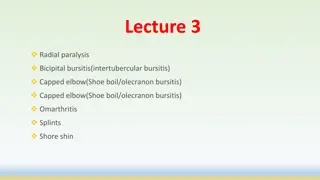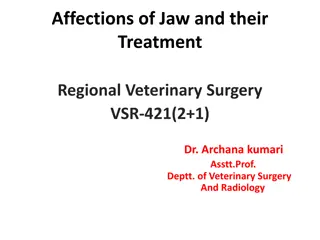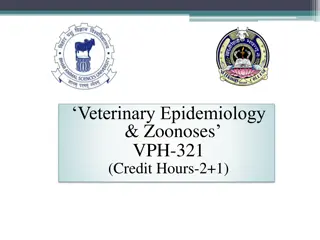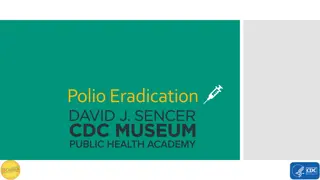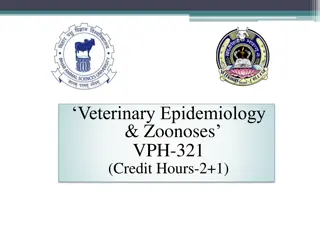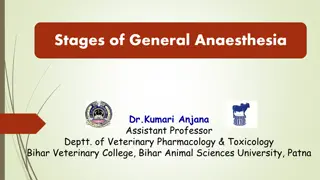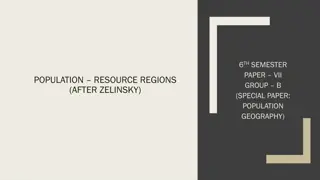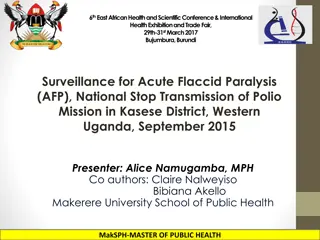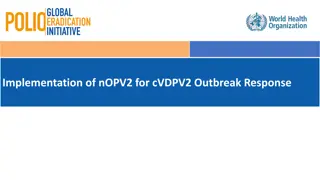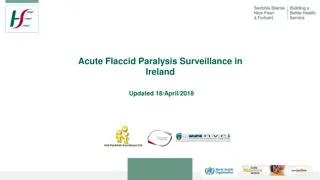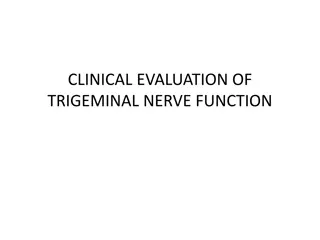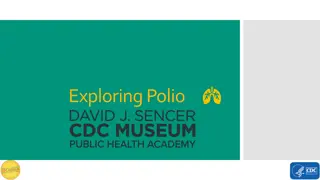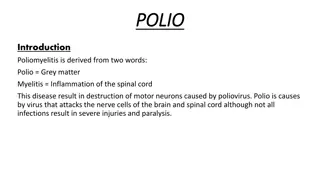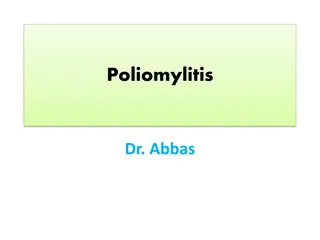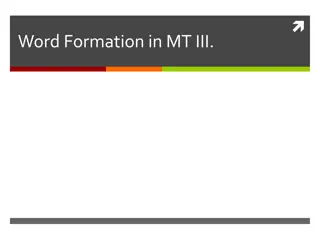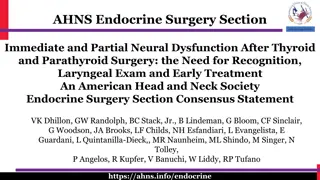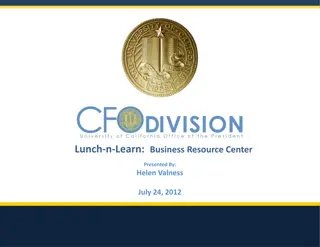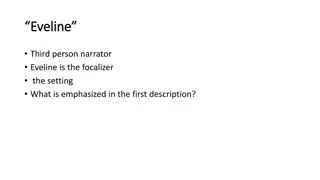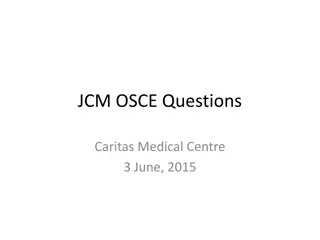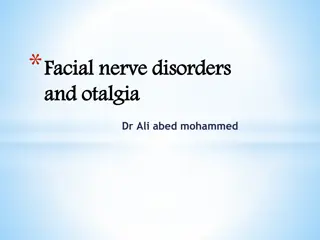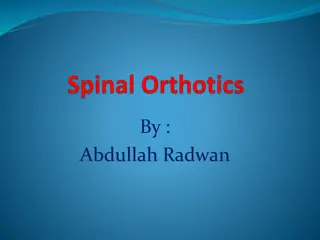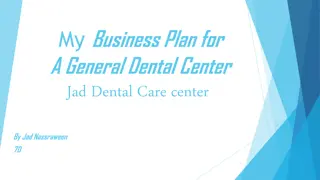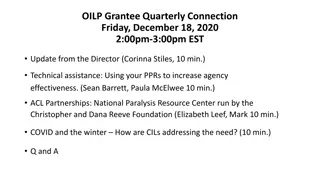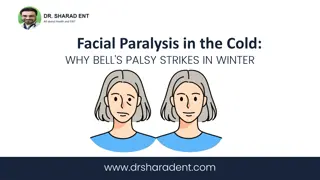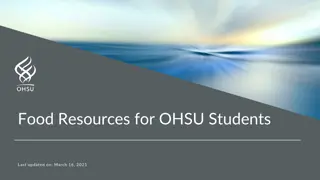Efficient Resource Mobilization and Management Strategies by Dr. Abraham Maliet Mamer
This content discusses efficient resource mobilization and management strategies, emphasizing the importance of understanding the typical cycle of resource regime, defining resources, identifying resources, and mobilizing resources effectively. It provides insights into resource allocation methodolo
1 views • 12 slides
Goddard Space Flight Center Integrated Design Center Overview
The Integrated Design Center (IDC) at Goddard Space Flight Center comprises various labs focusing on instrumental, mission, architecture, and planning design. Since its inception in 2001, the IDC has completed numerous studies and evolved its capabilities. The center follows a self-funded business m
6 views • 30 slides
Skeletal Muscle Relaxants and Neuromuscular Blockade
Skeletal muscle relaxants are used to induce muscle relaxation during surgeries. Neuromuscular blocking agents act at the neuromuscular junction. These drugs can either peripherally reduce muscle tone or centrally cause muscle paralysis. Different types of muscle relaxants are classified based on th
6 views • 23 slides
Comprehensive Overview of UNRMS Framework and Principles
UNRMS (UN Resource Management System) aims to promote sustainable resource management globally through innovative frameworks and principles. It encompasses various natural resources and supports sustainability at different scales. Stakeholders can use it to assess projects against environmental, soc
5 views • 10 slides
Common Elbow and Shoulder Joint Conditions in Veterinary Medicine
Learn about radial paralysis, bicipital bursitis, capped elbow, and omarthritis in veterinary medicine. Understand the etiology, symptoms, and treatment options for these conditions, including corticosteroid injections and surgical debridement. Recognize the signs of omarthritis and how it affects j
1 views • 15 slides
Veterinary Management of Jaw Affections and Treatments
Affections of the jaw in animals can range from congenital conditions to inflammatory diseases like gnathitis and lymphadenitis. Paralysis of the lower jaw, gnathitis from bit injuries, and lymphadenitis are discussed, along with their etiology, clinical signs, and treatment options such as general
0 views • 20 slides
Understanding Rabies: Epidemiology, Etiology, and Control Measures
Rabies is an acute fatal disease affecting humans and warm-blooded animals worldwide. It is characterized by abnormal behavior, nervous disturbances, and ultimately death due to respiratory paralysis. Rabies claims approximately 55,000 human lives annually, with efforts at control showing marginal s
1 views • 22 slides
Understanding Polio Eradication Efforts and Vaccine Development
Polio, a disabling disease caused by the poliovirus, mainly affects children and can lead to paralysis. Efforts to eradicate polio include the development of vaccines like the Inactivated Polio Vaccine (IPV) and Oral Polio Vaccine (OPV). The poliovirus' choice of host, ease of transmission, and impa
0 views • 15 slides
Understanding Rabies: A Comprehensive Overview
Rabies is an acute fatal disease affecting humans and warm-blooded animals, characterized by abnormal behavior, nervous disturbances, excessive salivation, and respiratory paralysis. It claims around 55,000 human lives globally, with efforts in rabies control showing marginal success. The etiology o
0 views • 22 slides
Understanding the Stages of General Anaesthesia in Veterinary Practice
Explore the four stages of general anaesthesia in animals, from the excitement and analgesia phase to delirium, surgical anaesthesia, and medullary paralysis. Learn about the criteria used to describe depth of anaesthesia and the specific characteristics of each stage. Dive into the complexities of
0 views • 14 slides
Population Resource Regions and Zelinsky's Classification
Geographers have long studied the relationship between population growth and resource adequacy, leading to the concept of Population Resource Regions (PRR) by W. Zelinsky. Zelinsky identified five types of PRR based on population-resource ratios, ranging from Type A with high resource utilization po
0 views • 8 slides
Enhancing AFP Surveillance for Polio Eradication in East Africa
This presentation discusses the importance of Acute Flaccid Paralysis (AFP) surveillance in detecting poliomyelitis cases, with a focus on the National Stop Transmission of Polio Mission in Kasese District, Uganda. The goal is to eradicate poliovirus through strategies such as immunization campaigns
0 views • 12 slides
Implementation of nOPV2 for cVDPV2 Outbreak Response
Circulating Vaccine-Derived Poliovirus (cVDPV) outbreaks, particularly cVDPV type 2 (cVDPV2), have increased in recent years. The novel oral polio vaccine type 2 (nOPV2) is an innovative tool developed over nearly 10 years to combat these outbreaks. Clinical trials have shown that nOPV2 provides com
0 views • 18 slides
Acute Flaccid Paralysis Surveillance in Ireland - Update & Global Polio Eradication Efforts
The Acute Flaccid Paralysis (AFP) Surveillance in Ireland is crucial for monitoring poliomyelitis in the context of global polio elimination initiatives. With no cure for polio, prevention through vaccination is key. The global effort to eradicate polio has seen significant success, with a sharp dec
0 views • 21 slides
Clinical Evaluation of Trigeminal Nerve Function
Sensory evaluation of trigeminal nerve function involves assessing exteroceptive sensations across its divisions, identifying sensory losses due to lesions, and distinguishing different types of lesions affecting sensation on the face. Motor evaluation focuses on the muscles of mastication to detect
0 views • 34 slides
Understanding Polio: Causes, Spread, and Eradication Efforts
Polio, a disabling and life-threatening disease caused by the poliovirus infection, can spread through contact with infected feces or droplets from sneezes/coughs. It mainly affects children, potentially leading to paralysis or respiratory issues. Lack of clean water and sanitation contributes to it
0 views • 15 slides
Understanding Poliomyelitis: Causes, Symptoms, and Prevention
Poliomyelitis, commonly known as polio, is an infectious viral disease caused by the poliovirus. It primarily affects young children, leading to the destruction of motor neurons. The disease can manifest with varying symptoms, ranging from mild flu-like symptoms to severe paralysis. Poliovirus is tr
0 views • 12 slides
Poliomyelitis: A Comprehensive Overview of the Disease
Poliomyelitis, commonly known as polio, is caused by a non-enveloped, positive, single-stranded RNA virus belonging to the Picornaviridae family. Paralysis is the most severe consequence of polio infection, with transmission occurring through the fecal-oral route. The virus primarily infects the GI
0 views • 23 slides
Understanding Word Formation in Medical Terminology
Explore the meaning of derived words in medical terminology related to head, color, and mortality. Learn about compound words with color names and terms for paralysis based on Greek elements. Engage in matching exercise for color prefixes and identifying types of plegia and dactylia. Fill in the mis
0 views • 13 slides
Zorua: A Holistic Resource Virtualization in GPUs Approach
This paper presents Zorua, a holistic resource virtualization framework for GPUs that aims to reduce the dependence on programmer-specific resource usage, enhance resource efficiency in optimized code, and improve programming ease and performance portability. It addresses key issues such as static a
0 views • 43 slides
Understanding Upper and Lower Motor Neuron Lesions: Effects and Manifestations
This content delves into the intricacies of upper and lower motor neuron lesions, detailing their effects and manifestations in the human body. It explores the causes, types of paralysis, reflexes, muscle tone changes, and the impact of lesions at various levels of the motor system. The insights pro
0 views • 45 slides
Stroke Recovery Peer Support Program Guidelines
Learn about the "Peers Fostering Hope Supported by the Dr. Ed & Bobby Yielding Fund for Stroke Recovery" initiative aiming to re-engage and re-integrate stroke survivors into the community. Explore how peer visitors provide support, encouragement, and hope for community re-engagement and reintegrati
1 views • 16 slides
Understanding Classroom Dynamics and Student Reactions to Social Inequality
Exploring the complexities of classroom management in times of social division, the content delves into reactions like paralysis, rage, and resistance to polarizing topics. It discusses how confronting inequity can lead to feelings of helplessness and shutdown, and addresses the challenges of advoca
0 views • 13 slides
Understanding Vocal Fold Paralysis and Neural Dysfunction After Thyroid and Parathyroid Surgery
This consensus statement by the American Head and Neck Society Endocrine Surgery Section highlights the importance of recognizing immediate vocal fold paralysis (VFP) and partial neural dysfunction (PND) following thyroid and parathyroid surgery. The report emphasizes the need for early identificati
0 views • 17 slides
Lunch-n-Learn Business Resource Center Presentation
Helen Valness presents at the Lunch-n-Learn Business Resource Center on July 24, 2012. Topics covered include organizational charts, UC experience, location details, services offered, and collaborative opportunities. The center's staff, including Peter Taylor, Chief Financial Officer, contribute a w
0 views • 29 slides
The Paradox of Choice: Too Many Good Options?
The paradox of choice delves into the debate between standard economics supporting the benefits of numerous options and experimental findings suggesting that hyperchoice can lead to decision paralysis and decreased satisfaction. While more choices may seem advantageous, excessive options can have ne
0 views • 46 slides
Eveline's Inner Struggle and Paralysis in James Joyce's Short Story
The story of Eveline unfolds as she grapples with her past, present, and uncertain future, symbolized by the contrast between the familiar and the unknown. Through themes of choice, nostalgia, and familial duty, the narrative delves into Eveline's internal turmoil, immobility, and the weight of expe
0 views • 13 slides
Clinical Case Study: Management of Thyrotoxic Periodic Paralysis
A 30-year-old man presents with bilateral lower limb weakness, weight loss, and abnormal ECG findings consistent with thyrotoxic periodic paralysis. The diagnosis, management steps, precipitating factors, and prophylactic medication are discussed. Additionally, a case of a 45-year-old chronic drinke
0 views • 48 slides
Fair and Efficient Multi-Resource Sharing in Social Networks
This paper explores the concept of fair and efficient multi-resource sharing in social networks, presenting a credit market-based framework for charge-free computing resource sharing. It addresses the challenges of escalating data volumes and the need for collaborative resource allocation strategies
0 views • 21 slides
CloudScale: Elastic Resource Scaling for Multi-Tenant Cloud Systems
CloudScale is an automatic resource scaling system designed to meet Service Level Objective (SLO) requirements with minimal resource and energy cost. The architecture involves resource demand prediction, host prediction, error correction, virtual machine scaling, and conflict handling. Module 1 focu
0 views • 37 slides
Understanding Facial Nerve Disorders: An Overview
Facial nerve disorders can lead to various symptoms such as facial paralysis and otalgia. This article covers the embryology, anatomy, and neuropathophysiology of the facial nerve. The development of the facial nerve complex occurs in the early stages of gestation, and abnormalities may be associate
0 views • 39 slides
Approach to Acute Flaccid Paralysis in Children: Evaluation and Management
Acute muscular weakness in children is a neurological emergency defined by sudden onset muscle weakness or paralysis in less than 5 days. When evaluating a child with acute flaccid paralysis, consider factors like onset rhythm, associated symptoms, and past medical history. A thorough physical and n
0 views • 45 slides
Understanding Orthoses: Types, Indications, Mechanisms, and Effects
Orthoses are mechanical devices used to support, stabilize, and protect various body parts. They can be categorized into different types such as cervical, cervicothoracic, thoracolumbosacral, lumbosacral, and sacroiliac orthoses. Indications for spinal orthotics include stabilizing the spine after a
0 views • 34 slides
Jad Dental Care Center Business Plan: Providing Quality Dental Services in Khalda, Amman
Jad Dental Care Center, based in Khalda, Amman, is a self-owned dental business with a mission to offer top-notch dental services to patients of all ages. The center aims to exceed patient expectations through friendly, reliable, and professional care. With a focus on sustainability and customer sat
0 views • 13 slides
Quarterly Connection: Updates from OILP Grantees and ACL Partnerships
The Quarterly Connection on December 18, 2020, will feature updates from OILP Grantees, including program performance reports and insights on addressing COVID challenges. Additionally, ACL partnerships with the National Paralysis Resource Center will be discussed, highlighting the valuable support a
0 views • 22 slides
French Government Rushes Tax Cuts and Minimum Wage Rise Amid Yellow Vest Protests
The French government is pushing through tax cuts and a minimum wage increase to quell the ongoing Yellow Vest protests, which have been dwindling after causing disruptions for a month. President Emmanuel Macron's proposed measures, worth billions of euros, are set for parliamentary discussion and v
0 views • 22 slides
Facial Paralysis in the Cold: Why Bell's Palsy Strikes in Winter - Dr Sharad ENT
Bell's palsy is a temporary facial paralysis affecting one side of the face, often linked to viral infections and stress. Cold exposure in winter is considered a possible trigger due to increased viral illnesses, reduced blood flow, and irritation of
1 views • 7 slides
Employee Community Resources at UF: Family Resource Coordinator Services
Providing UF employees access to valuable community resources through the Family Resource Coordinator, including discounted services for childcare, housing, health & wellness, transportation, entertainment, campus discounts, food, and more. Additional on-campus resources such as the Field and Fork P
0 views • 6 slides
Food Resources for OHSU Students - SNAP Eligibility and Support Programs
Food resources available to OHSU students include the Food Resource Center (@OHSU), SNAP assistance, and student food support websites. The Food Resource Center provides grocery items weekly for pick-up at the Student Center, with no income requirements. SNAP eligibility criteria have expanded to in
0 views • 12 slides
Overview of CNAF Research Center Infrastructure
This document provides detailed information about the infrastructure and resources at the CNAF Research Center, including CPU and storage capacities, support for experiments, resource distribution, and management of pledge requests. The content discusses the handling of CPU usage, support for variou
0 views • 31 slides




